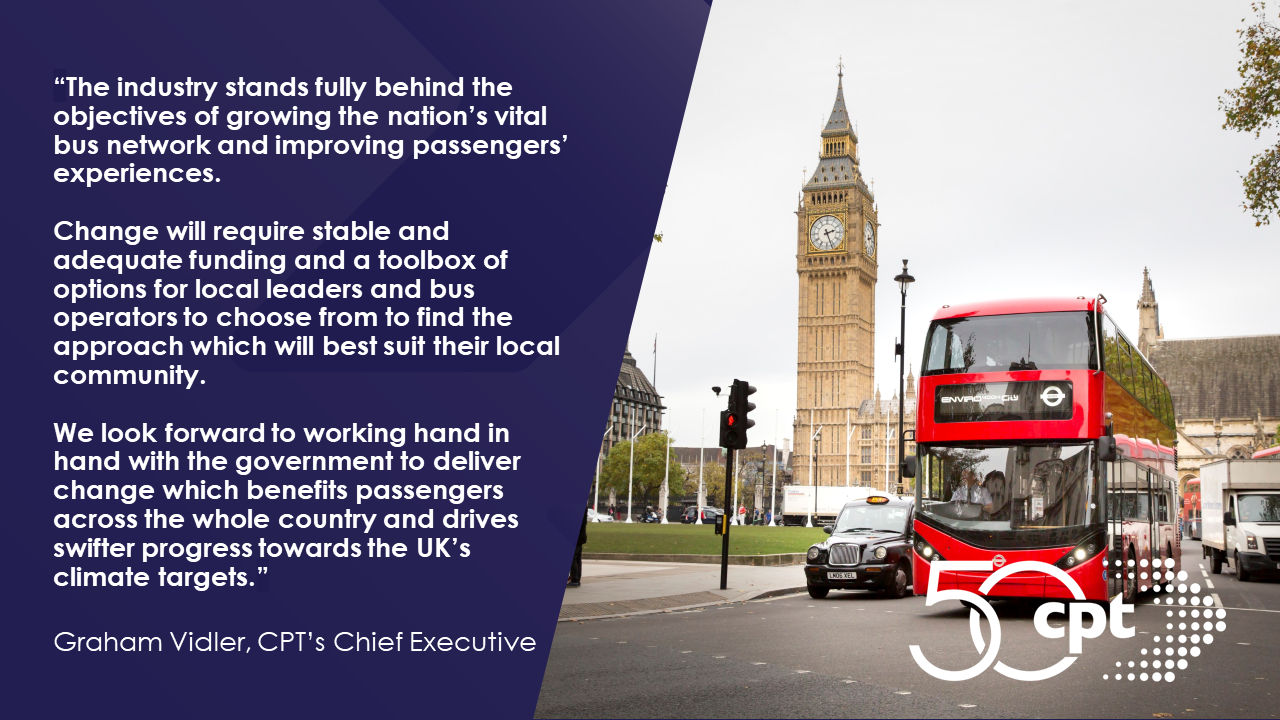July 11 2024
Responding to Transport Secretary Louise Haigh's 11 July visit to Manchester and her pledge to kickstart a 'bus revolution', Graham Vidler, CEO at the Confederation of Passenger Transport said,
“The industry stands fully behind the objectives of growing the nation’s vital bus network and improving passengers’ experiences.
“Change will require stable and adequate long term funding and a toolbox of options for local leaders and bus operators to choose from to find the approach which will best suit their local community. Immediate action must prevent a cliff edge return to fully commercial fares when the £2 fare cap ends in December – a scenario that would harm passengers and services.
“We look forward to working hand in hand with the government to deliver change which benefits passengers across the whole country, prioritises buses in order to curb congestion and air pollution, and drives swifter progress towards the UK’s climate targets.”
ENDS
Notes for editors
Buses play a pivotal role in keeping the UK economy moving and our communities connected. They are the nation’s most affordable, accessible, and popular form of public transport - carrying over 10.2 million passengers every day and making up more than half (60%) of all public transport journeys. For more data on the value of bus see CPT’s website.
Recent polling by You Gov for CPT showed that spending is way below what many voters clearly think it should be: four in ten voters want investment in bus services to be made a top priority for transport spending by the new government. People also want to see more frequent buses, fares kept low, and more new routes. What is more, these three priorities matter significantly more than changing who runs the buses, and if services improve many people will use the bus more often – a shift that will reduce road congestion and cut air pollution.
CPT and its members will work with local leaders whatever the regulatory model. Many local leaders – such as those in Leicester, Portsmouth, and Norfolk - are already shaping the delivery of better bus services by working closely with commercial bus operators through the contractual arrangements available under Enhanced Partnerships.
Labour’s recently published plan for rail services includes a commitment to introduce modal shift targets (a change from one form of transportation to another, in this case away from private car usage and towards the greater use of all public transport modes). CPT is looking to the new government to help its members deliver their part of this transition.
Driving Britain Forward CPT’s manifesto for bus set out six key priorities for the new government. In this CPT calls for a five-year spending plan for bus, as happens in rail, to provide confidence and maximise the value of all investment in the sector. Consolidated, consistent long term funding streams will be key for securing full decarbonisation of the bus sector fleet. The current 21-month funding settlement for bus services ends in April 2025. A lack of clarity over future funding undermines confidence and prevents operators and local transport authorities (LTAs) pursuing longer-term service developments.
Some bus services cannot be run on a commercial basis, so CPT believes the new Government must fund councils to support essential lifeline services - over half (56%) of which have been lost since 2009/10 due to cuts in local government funding.
Earlier this year CPT commissioned research to inform discussion about options for maintaining low fares over the long term. Alternatives to the national fare cap – how can the next government make bus travel more affordable for more people presents the findings of that study which examined the pros and cons of various forms of support including a continued fare cap.
In April CPT welcomed DfT (Department for Transport) proposals to speed up training for bus and coach drivers and to lower the minimum age for them to drive longer journeys. To help address ongoing driver shortages (4.2% in the bus sector) the government should bring these changed forward promptly.
